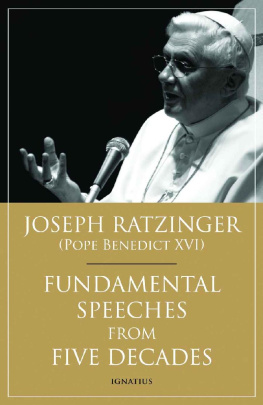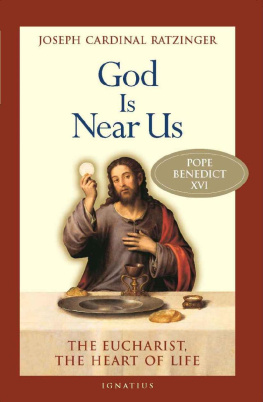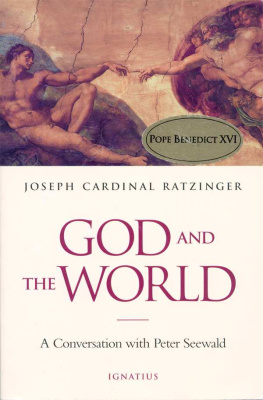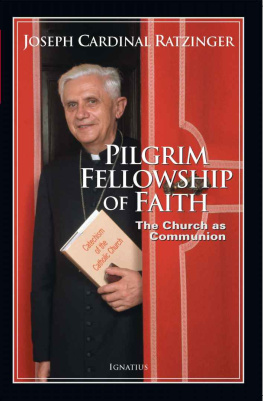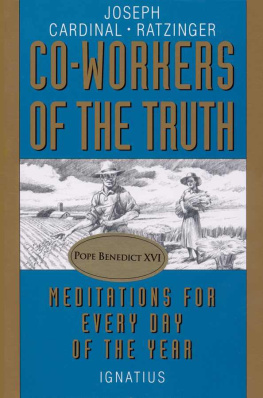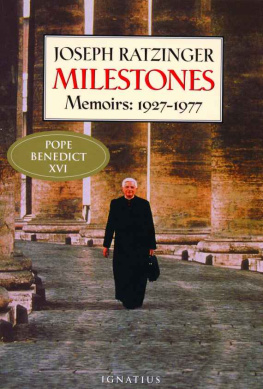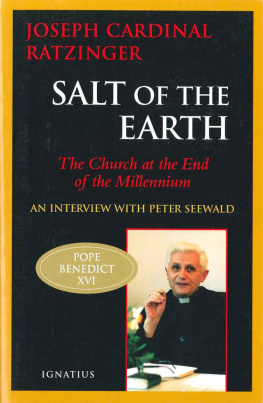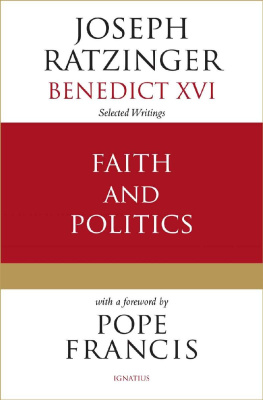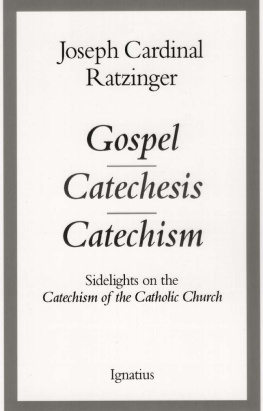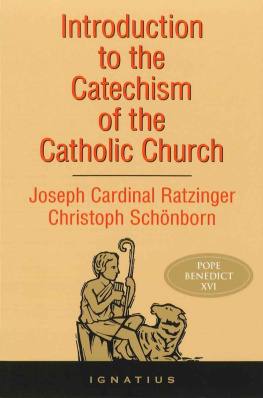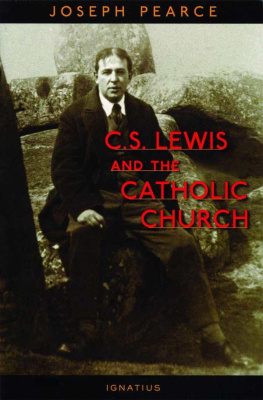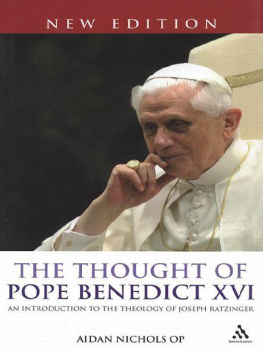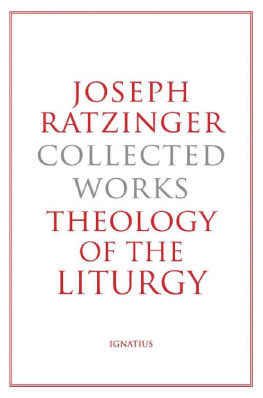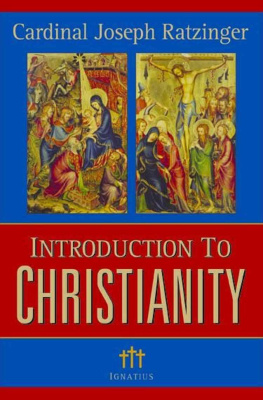FUNDAMENTAL SPEECHES
From Five Decades
Joseph Ratzinger
Pope Benedict XVI
FUNDAMENTAL SPEECHES
From Five Decades
~
Edited by Florian Schuller
Translated by Michael J. Miller,
J. R. Foster, and Adrian Walker
IGNATIUS PRESS SAN FRANCISCO
Original German edition:
Grundsatz-Reden aus fnf Jahrzehnten
2005 by Verlag Pustet, Regensburg
Photograph of Pope Benedict XVI
Stefano Spaziani
Cover design by Roxanne Mei Lum
2012 by Ignatius Press, San Francisco
All rights reserved
ISBN 978-1-58617-303-6
Library of Congress Control Number 2011940708
Printed in the United States of America
CONTENTS
ON THE GLOBAL TASK OF
THE CHRISTIAN FAITH
FOREWORD
by Florian Schuller
We must ask how the Academy, as a place for interpretation, is to be understood in the contrasting light of contemplation and action. This was the question posed by Joseph Cardinal Ratzinger, who at that time had been working in Rome for seven months, on the occasion of the meeting celebrating the twenty-fifth anniversary of the Catholic Academy of Bavaria.
For more than forty years, Joseph Ratzinger again and again gave an answer in our House, whose task according to its constitutions is to clarify and promote relations between the Church and the world. In keeping with this mission statement, the directors of the AcademyKarl Forster, Franz Henrich, and in 2004 the undersigned as wellinvited him to reflect on a wide range of topics.
Joseph Ratzinger lectured at our meetings seventeen times in all, as a professor from Bonn, Mnster, Tubingen, and Regensburg, as Archbishop of Munich and Freising, and as Prefect of the Congregation for the Doctrine of the Faith. Eleven of these lectures were published in a form that he authorized. When we read through them again, we were surprised by their lasting relevance and are therefore presenting them as an anthologyas fundamental speeches that display the breadth and core of the theological thought of Pope Benedict XVI.
Certainly, an inquiry like the one from the turbulent [late 1960s and early] 1970s would not necessarily be formulated today as: Why I Am Still in the Church. That the problems expressed in the title have meanwhile intensified drastically, however, needs no proof. Thus there is not only a special charm in studying a document by a theologian and bishop who has since been elected pope that states the reasons why he still is in the Church, but at the same time the reader gets a concise commentary on what it means to be a believer in the Church, an explanation that goes much deeper than the usual discussion of arguments pro and con.
The text that has made the most profound impression on the intellectual consciousness of discerning contemporaries is probably the statement that Cardinal Ratzinger made in his dialogue with Jrgen Habermas. At the invitation of the Academy, the representative par excellence of secular rational thought met in January 2004 for the first time with the most important representative of Catholic faith-based reflection. In acknowledgment of the intellectual vigor of the new pope, this encounter was regularly recalled on editorial pages and interpreted as a signal of new alliances in dialogue despite ongoing differences about basic principles.
The reader will find these fundamental speeches arranged, not chronologically, but thematically, starting with a paper that the newly appointed cardinal presented in October 1977 at a conference in Rome on the topic of The Nature and Commission of the Petrine Ministry. The interpretation set forth in it not only can help us to understand in general how Pope Benedict XVI views the Petrine office in its ministry of establishing unity, which has now been entrusted to him, but also explains the surprising emphasis in his homily after his election, when he called the ecumenical endeavor one of the primary challenges that must be addressed.
Next come three texts on central tenets of the Creed and two theological reflections on the Church. The task of the Christian faith in the world likewise plays an important role in three papers, a fact due to an intellectual development that was formulated with explosive force and logical consistency in Joseph Ratzingers lecture on Europe, a Heritage with Obligations for Christians, which after more than twenty-five years still has political relevance as well.
The conclusion consists of two tributes. The Bavarian Prime Minister Alfons Goppel and Romano Guardini are precisely delineated as individual personalities, and their accomplishments are systematically evaluated.
One sentence in this book can serve as a summary of the abiding core of Joseph Ratzingers convictions, one that will leave its mark on his pontificate and is not only his message to us but the message of Christianity in general: The hope of Christianity, the prospect of faith is ultimately based quite simply on the fact that it tells the truth. The interpretations presented here help us to speak the truth of Christianity in the dialogue of hearts and minds; they are meant to spur us to action and to open the way to that contemplation from which they were born.

With Pope John Paul II at the meeting of the Pope with artists and journalists in the Hercules Hall of the Royal Residence in Munich, which was planned and organized by the Catholic Academy in Bavaria; November 19, 1980 (Photograph: Academy Archive / Felici ).
The Petrine Ministry
In the year when Professor Joseph Ratzinger was appointed Archbishop of Munich and Freising and raised to the rank of cardinal, the Catholic Academy in Bavaria conducted an academic symposium in Rome from October 11-14, 1977, which was dedicated to the theme of Service to Unity: On the Nature and Commission of the Petrine Ministry. The occasion was the eightieth birthday of Pope Paul VI and the presence of the Bavarian bishops for their ad limina visit in Rome. The contribution by Joseph Cardinal Ratzinger reprinted here presented an outline of a martyrologically understood interpretation of the papal primacy from the ecumenical perspective and, at the same time, an outlook on the future situation of Christianity that emphasized the unifying function of the papacy as a permanent commission. The lecture served as the conclusion of an event that dealt with the topic from the perspectives of exegesis, Church history, systematic theology, and ecumenism. Among the internationally renowned lecturers were also Professor Alberigo (Bologna), Professor Jean-Jacques von Allmen (Neuburg), Professor Walter Kasper (Tubingen), Professor Franz Muner (Regensburg), and Professor Wilhelm de Vries, S.J. (Rome ).
THE PRIMACY OF THE POPE AND
THE UNITY OF THE PEOPLE OF GOD
I. The Spiritual Basis for Primacy and Collegiality
The papacy is not one of the popular topics of the post-conciliar period. To a certain extent it was something self-evident as long as the monarchy corresponded to it in the political realm. Ever since the monarchic idea became extinct in practice and was replaced by the democratic idea, the doctrine of papal primacy has lacked a point of reference within the scope of our common intellectual assumptions. So it is certainly no accident that the First Vatican Council was dominated by the idea of primacy, while the Second was characterized mainly by the struggle over the concept of collegiality. Of course, we should immediately add that, in adopting the idea of collegiality (along with other initiatives from contemporary life), the Second Vatican Council sought to describe it in such a way that the idea of primacy was contained within it. Today, now that we have gained a little experience with collegiality, its value and also its limitations, it looks as though we have to start again precisely at this place in order to understand better how these seemingly contrary traditions belong together and thus to preserve the richness of the Christian reality.
Next page
